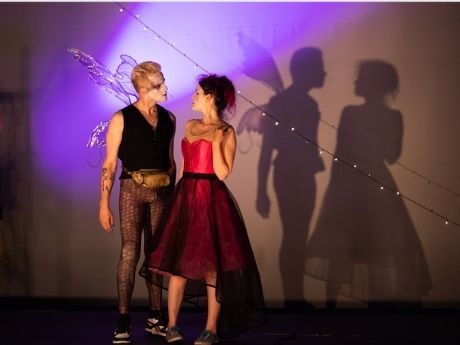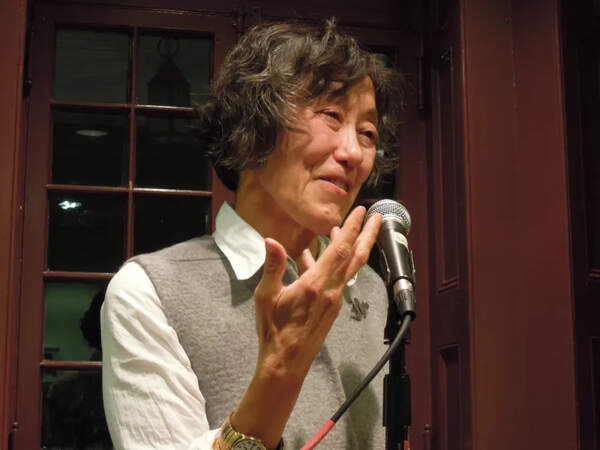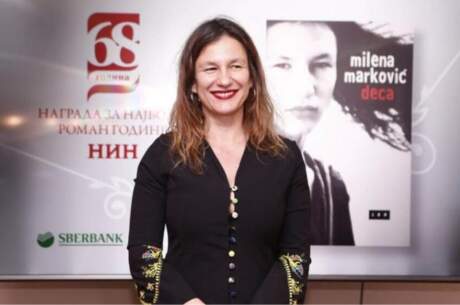Interviews
Poets Theatre: An Interview with Darcie Dennigan

Poets theatre, as Kevin Killian and David Brazil define it in their introduction to the Kenning Anthology of Poets Theatre, occupies "the charged space between the disputed territories of performativity, theatricality, and the textual." Over the past few years Darcie Dennigan has been exploring that space by translating work by contemporary poets into full-length staged productions. But when it came to her project of translating Farnoosh Fathi's poetry manuscript Granny Cloud, the translation went awry. The resulting play, "Dolores Goes to Poetry City," is not so much a faithful rendering as what Dennigan calls "an infection of the poems of Farnoosh Fathi." Fathi recently interviewed Dennigan about her play, which was performed in June 2021 by the Wilbury Theatre Group.
Farnoosh Fathi: What does writing plays using poetry offer you that writing poetry doesn't?
Darcie Dennigan: Poetry is alchemical and mobile, making sense in multiple directions and dimensions at once. I love it. But when bodies are on a stage creating a semiotic space, on top of poetry's own alchemy, there's more collision and more precision of meaning possible: movement collides with tone of voice with sounds of words with light with whatever context the audience is bringing.
Something Leo Steinberg said about Cubism—"a space generated by dint of successive utterance"—is what I think poetry makes possible on a stage.
Sitting alone and reading poetry from a book is intimate, fun, sensual. Poetry readings, not so much. So poetry in theatre—poets theatre—is another way to create and enlarge that bodily experience of reading. I didn't discover Richard Foreman until this year when Hilton Als posted on his Instagram a photo from Foreman's Eddie Goes to Poetry City
(that title was all I needed to go down the Foreman rabbit hole). Oh my god, the chaotic sets and the soundscapes of his productions. His plays work on me like poetry. You have to live in the present moment of the language. All plot takes place in the mind. Did you know that Gertrude Stein was young Richard Foreman's lodestar? I was already writing "Dolores Goes to Poetry City" when I learned that, but knowing your own close relationship to Stein's work, I felt okay, yes, I'm on the right track.
Providence, where I live, has a history of poets theatre, and I want my work here to be part of a continuum. Keith and Rosmarie Waldrop started the Wastepaper Theatre here in the 1970s, hoping that in "Relaxing, poetry may sneak in the door and surprise us." The Wastepaper Theatre declared: "If an institution appears on our non-stage, we will poetically abolish it. We are interested in casual poetic life." Yes. Poets theatre can't take itself seriously and I seriously ascribe to that.
Farnoosh Fathi: What in my poems feels like the best doorway for your own writing?
Darcie Dennigan: Unquestionably, "Good Barber of the Pea, I exhume, high in the vag" is my best doorway into your Granny Cloud poems. Your manner of declaring and naming things says to your reader "Hello! It is spring again! Eternal spring, in the rhetoric of the world!"
There's the playfully formal "Good barber of the pea." I'm like, "What, is this the beginning of a Ruth Krauss book?!" Then the bizarre boomerang of exhume instead of exclaim, knocking me off kilter so that I have to listen more closely (—I first read this poem on my phone so I think of it as a scroll-stopper). This line is very serious—poetry is in the body like the humours, like the soul, and the poet speaking this line knows that.
But also my finding "Barber of the Pea," which you dedicated to John Ashbery, coalesced around a few other events, and in that sense it was a doorway into thinking about what kind of poet I want to be. Here's the event cluster:
October 3, 2016, vagabonding a playwriting class with the great human, poet, playwright Erik Ehn, I heard him say, "The writing is just a medium, it will be destroyed. The play is the material we require to move toward the object of our love."
October 17 2016, found your poem "Barber of the Pea" online.
Nothing else could have made me miss Erik's headspin of a class, which I skipped that Monday morning to read the 1950s unabridged dictionary that had been propping up my radio. Because your poem made me realize that I had forgotten about words. Your words are oases! I wrote to you that day about it and you wrote back.
October 20 2016, Brigit Pegeen Kelly's death was announced.
We talked a lot that day and that month, because she had been the person for each of us: the poet who helped lead us to ourselves, who had helped us see a way we could make for ourselves through the world, in poetry...
FLASHBACK, 2013, Us talking about Brigit that October got me thinking of our mini reading tour in 2013...
We were driving from Iowa City to Chicago and wondering if we should detour a few hours to visit Brigit in Illinois. My three-month old daughter was with us on tour or I would have said yes. YES! Ugh.
But that was also the trip where I thought, "Farnoosh Fathi, who gave you permission to do a poetry reading like that?!" We were doing a paid college reading with the whole podium/microphone deal. You stepped right off the stage and shared copies of your book among those present, chose a poem, and then it was a like a recitation of the Diamond Sutra, the audience chanting different lines from the poem, roving with copies of your book, making a buzzing aharmony...
And so it was that the obvious whacked me on the chin: the myriad ways that the poet's voice and words can reach across to the listeners... Two days later in the back of a taxi we collaged a play out of our poems—we were nuns exalted by exercise—and performed it at a reading in Chicago. When I found myself on the floor of a bar doing leg lifts while saying "nuns buns" over and over I thought, "Finally a poetry reading where I don't feel slightly ridiculous."
So "Barber of the Pea" led me toward and back to all of these things: your oases of words, the idea of mentorship and teachers and how a poem is always speaking back to the poems/poets that raised it, the aim of writing out of love and for fun, and, making explicit how poetry is made and received in the body. If I'm not playing and praying, I'll die. That's what your poems teach me.
Farnoosh Fathi: How did you come up with the different roles/characters in Dolores Goes to Poetry City?
Darcie Dennigan: Dolores is just me. The other characters are also aspects of my writing self. I named them after resident actors in the Wilbury Theatre Group in Providence, which staged the show.
Monica is the writer's conscious brain.
Jason is a snail, because snails people your poems, but also because snails are spirals. And snails' movements are nearly imperceptible. And they carry their shelters with them. These are all qualities I want in poems.
Treglia is a cudgel, a fighter, a spirit I aspire to. I based her on this excerpt from a Foreman interview:
I know how easy it is for me to want to love, to want the caress of reassurance; and how quickly that can deteriorate into not being alert through all the difficulties, all the stumbling, all the problems that force me to invent. I am personally happiest when I am forced to solve a problem. The aggression onstage has to do with that. I want the performer and the performance to give the audience the feeling that there are problems to be solved.
The PoetryFairygodmother is you, or your spirit. They're on a skateboard the whole time. They're eating marshmallows and delighting in the music. And also they see how delicate the world is—they see that every movement might crush the skull of a baby underfoot.
Instead of directing this myself, I brought it to Josh Short, the artistic director at the Wilbury, because the way he directs is really beautiful: he made it a creative, collaborative experience for this group of actors. You trusted me with your poems, and I wrote this play and trusted Josh with the script, and he made this show that was beyond my imagination. A chain of faith and metamorphoses.
Farnoosh Fathi: You adapted Kate Colby's I Mean and Mónica de la Torre's The Happy End/All Welcome for the stage and originally you planned on adapting these poems from Granny Cloud. What was it about my poems that caused you to move from adaptation into a kind of writing from/through the poems?
Darcie Dennigan: Your poems from Granny Cloud can be faithfully translated for the stage in a lot of fun ways because your way of killing empty language makes for a very exciting funeral—sprightly, baroque. Even one line is a whole scene! E.g. from "Taut Rope Alley": "Now we are taut to examine GAIT, the alley test of temperament—from the kneetops..."
In taut I hear school and in the wireless technology of the GAIT acronym is funny walking and in kneetops there is treetops and kneehighs... I would start with an elderly woman in kneesocks going across a high jungle gym saying the ABC's into a headset.
Or, what if I had 10 kids each memorize 1-2 lines of your poem "Lunchtime Prayer," and then I started an edible suds bubblemaker going onstage and told them, 1) Pop as many bubbles as you can—with your mouth! and 2) yell your lines the whole time you're popping bubbles?
But the overwhelming feeling of your poems was of a diction and exuberance and prayerfulness that was bringing me elsewhere... And I named that elsewhere Poetry City.
I was overtaken by a kind of good jealousy too, as I read your poems and was also writing my own stuff. Like, man, her poems are poetry city and I don't know how to get there! Lost in my creative life is how I was feeling. And I thought, maybe selfishly, could Farnoosh's poems and person be a compass? This question overlapped with a virtual class I took with Pig Iron in Philadelphia, partially on Jacques LeCoq, who says something in his book about clowns in circuses often being the older performers. There I was, in mid life, wanting to strip off all the adulting of poetry, all the academic garb & podiums. I wanted to be totally naked and have delicate little clown noses where my nipples would be. One thing they teach at Pig Iron is tout bouge/everything moves and voila, that's the best writing advice I ever overheard. I thought, "Farnoosh is already moving to Poetry City—and the lilacs are moving there, the clouds too"—everything we read in this Pig Iron class was moving to Poetry City—"and I can go too. I will slide there on her language..." I used your poems. That's a terrible verb, but there it is. I used your poems to think through what I love and need about poetry and what I want to leave behind.
In the play, Dolores doesn't get to Poetry City. There's a lot I could say about why I made that choice. But. You told me recently that one place you live is under a Paul Celan sky. I found a volume of Celan poems and opened it up today and—this is the way things work and move—here are the last three lines of the poem I opened to:
Where did the way lead when it led nowhere?
O you dig and I dig, and I dig towards you,
and on our finger the ring awakes.


